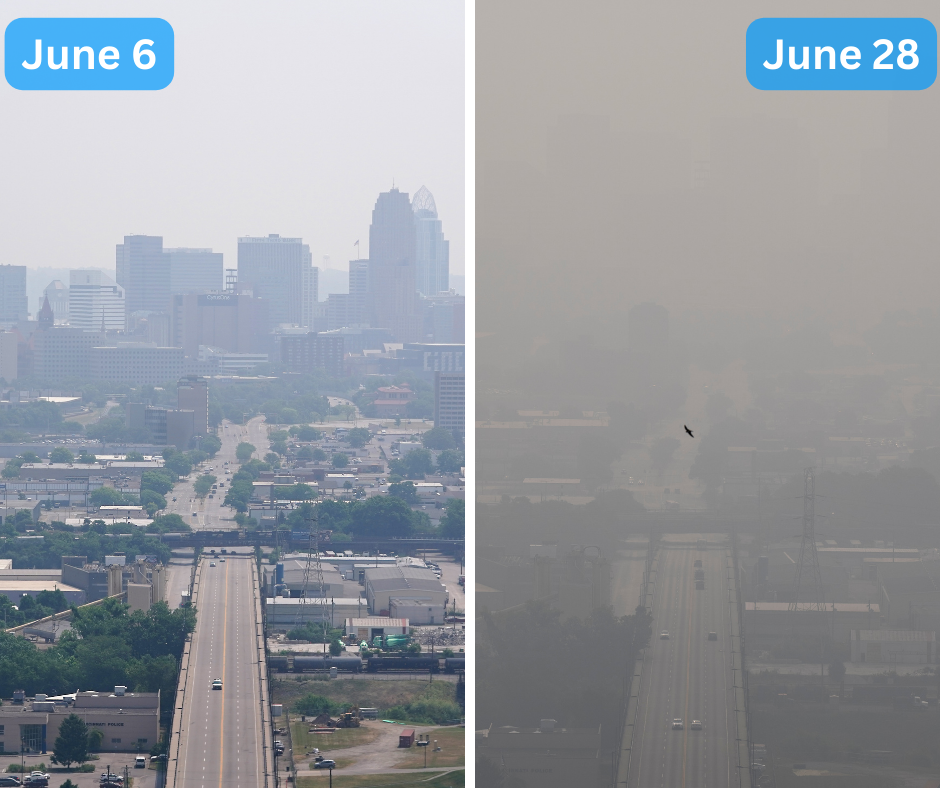Should I wear a mask to Taylor Swift? Here's what to know about air quality in Ohio

- Oops!Something went wrong.Please try again later.
The Ohio Environmental Protection Agency and Southwest Ohio Air Quality Agency have issued air quality alerts until the end of Wednesday due to lingering smoke from wildfires in Canada.
This is the second air quality alert from the Ohio EPA in three weeks, with the air quality index expected to be in the "unhealthy for sensitive groups" to "very unhealthy" ranges.
"It's important to take poor air quality seriously, as exposure to smoke can cause health problems," Dr. Bruce Vanderhoff, director of the Ohio Department of Health, said in a release. The state health department advises people to limit outdoor activity, especially outdoor exercise, and spend more time indoors while the alert is in place.
Here's what to know about poor air quality in Cincinnati this week:
When will air quality improve?
It's difficult to predict when the haze will lift because air pollution is weather dependent, said Joy Landry, Communication Specialist at the Southwest Ohio Air Quality Agency.
She says the agency is taking it "one day at a time" in terms of air quality conditions, but that they are encouraging people to stay indoors.
More: When will wildfire smoke from Canada move out of Greater Cincinnati? Here's what we know
Will wildfire smoke in Cincinnati affect me at the Taylor Swift concert?
Depending on the air quality index on Friday, bad air quality might be a health risk. Cincinnati's air quality index measured at 175 Thursday morning, down from 183 Wednesday evening, according to the Southwest Ohio Air Quality Agency.
An AQI above 101 begins to impact sensitive groups, including those with heart or lung disease, older adults and children.
Air quality index basics: How it works, what each color code means and how to stay safe
Prolonged and heavy exertion outdoors increases your risk for exposure to poor air quality when the AQI is high, so refraining from dancing all night long to your favorite Taylor songs might be in order.
Watch out for wheezing, chest discomfort and difficulty breathing ‒ these are all warning signs that bad air quality is affecting your health.
Should I wear a mask to the Taylor Swift concert in Cincinnati?
Cloth masks like the traditional COVID-19 masks aren't effective at stopping exposure to air pollutants, Landry says. A fitted N-95s may be a help, but Landry recommends consulting your health provider for specific guidance based on any existing medical problems.
What are the effects of breaking the smoky air?
The wildfire smoke contains particulates, small droplets that can be inhaled into your lungs and cause irritation of the eyes, nose or throat, coughing, shortness of breath and chest pain, according to the Ohio Department of Health. Particulate matter can also aggravate chronic heart and lung conditions.
More: Breathing Cincinnati's air equivalent to smoking 2 cigarettes, calculator states
Individuals with symptoms related to respiratory issues may find that those symptoms become inflamed during periods of poor air quality even with precautions. Those impacted could face anything from fatigue, or a low-grade headache to more serious complications like a heart attack, stroke, or an asthma attack, said Dr. Julian Guitron, a lung specialist and surgeon at Christ Hospital.
"Anybody that has predisposing conditions, particularly lung and heart, has an increased risk of having an exacerbation of those conditions," Guitron said. "You just feel off."
What precautions should I take?
The Ohio Department of Health offered several suggestions for limiting the effects of the poor air quality:
Spend time in a room you can close off from outside air.
Avoid using candles, gas, propane, wood-burning stoves, fireplaces and aerosol sprays. Smoking tobacco products and vacuuming may worsen indoor air pollution.
If you have a central air conditioning system, use high efficiency filters to capture fine particles from smoke. If your system has a fresh air intake, set the system to recirculate mode or close the outdoor intake damper.
Stay hydrated by drinking plenty of water. If your eyes, nose or throat are irritated, running a humidifier may provide some relief.
Reporter Brooks Sutherland contributed.
This article originally appeared on Cincinnati Enquirer: Air quality alert in Ohio: When will the haze go away?

